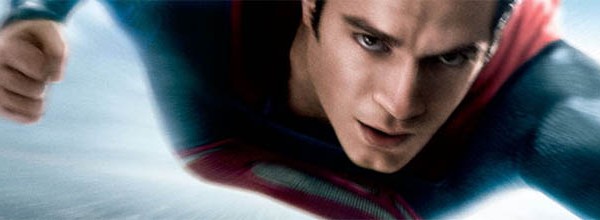We open on a dying Krypton. Faced with the destruction of their planet, Jor-El (Russell Crowe) and his wife Lara (Ayelet Zurer) decide to send their newborn son Kal-El to Earth, in possession of the key to Krypton’s survival. Thirty-three years later, Kal-El (Henry Cavill) is travelling the world anonymously, seeking out the truth about his identity. On his case is newshound Lois Lane (Amy Adams) and, before long, his father’s old foe General Zod (Michael Shannon). As we move forward in the present, flashbacks take us back to Clark’s childhood and teenage years, illustrating how he became the man of steel he is today.
To begin with, Snyder and screenwriter David S. Goyer deserve praise for packing so much into one film. Despite admiring the ambition, however, it is difficult not to concede that in attempting to portray so much, Goyer and Snyder have made too many sacrifices. Large portions of the story are glossed over or dashed off with one or two lines of clunky exposition and, when Snyder has done such a beautiful job of bringing this world to life on camera, you find yourself wishing you could see more of it.
At the heart of Man of Steel is Henry Cavill, who certainly looks the part but, in contrast with Brandon Routh’s funny yet noble turn in Bryan Singer’s Superman Returns (2006), is a relative blank. Undoubtedly, his hands have been tied by the limited characterization in Goyer’s script, but there is an oddly expressionless quality to Cavill that sucks the poignancy out of the emotional scenes.
Elsewhere, Amy Adams’ performance possesses none of the edginess of Reeve-era Lois Margot Kidder, while Michael Shannon is a shade too reminiscent of Star Trek’s unimpressive villain Nero – there’s a lot of shouting but, despite Shannon’s craggy features and imposing presence, Zod inspires little fear.
Certainly, as a sci-fi action spectacular, Man of Steel has – without question – the best special effects of any film this year. Unfortunately, towards the end, Snyder’s film becomes entirely about what he can portray in terms of alien spacecraft, explosions and mid-air battles. Story points and logic are thrown out the window in favour of things blowing up, and the one, seemingly hopeless civilian rescue sequence – a key feature of the Superman comics – doesn’t even involve Clark.
Perhaps the biggest problem with Man of Steel is that this Superman feels more like Kal-El, son of Krypton, than Clark Kent, corn-fed Kansas farmboy. By extension, more focus is placed upon what is alien than what is human, the majority of the time being spent on Kryptonian ships, in clashes with Zod’s black-clad minions and with Jor-El rather than emotional lynchpin Jonathan Kent (a likeable turn from Kevin Costner).
What this comes down to is that Superman’s love of Earth and humankind has no clear foundation. Snyder’s choice to excise the Kents finding baby Kal-El in that Kansas field, for example, undermines something key to the story: the notion that all of Clark’s ideas about human goodness stem from that initial act of kindness.
Though Man of Steel is a true feat of filmmaking, and Zack Snyder is undoubtedly a director who can deliver on the visuals, he has ultimately made a film that, much like its leading man, looks perfect but is lacking in substance.
![]()
Released in UK cinemas on Friday 14 June 2013.
> Buy Man of Steel on Blu-ray.
What did you think of Man of Steel? Let us know below…

